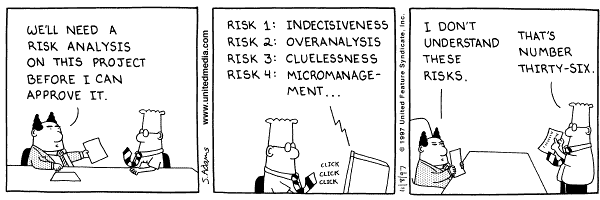This is the second in my series of articles on how you, a business owner, can use your lawyer most effectively. The most frequent conversation I have when meeting with new clients is to explain the role of the lawyer in advising a business. Many have never worked with a lawyer before, or worked with one in a different area. Why are we useful, and what the hell do we actually do that adds value to your business? Once you know what we do, it’s much easier to use us effectively – saving you time, money, and heartache as your company evolves.
A lawyer’s job is to help businesses to understand and manage risk. Full stop.
On Risk
Most entrepreneurs are going into business because they have a great idea – a product or service that they believe they can sell. The act of going into business is risky in and of itself. You’re putting your time, money, reputation, and relationships on the line. The business world is a scary place, especially when you’re the small fish in the pond. Your competitors are constantly working to out-manoeuvre you. Your employees, contractors, investors, customers and suppliers have expectations and problems of their own. The tax man knocks on your loudly and frequently. There’s a maze of regulations to navigate.
 Many of those risks are sight unseen for entrepreneurs. Some manage to bob and weave through them by chance, blissfully unaware of close calls. Often in a first meeting I have the unpleasant task of lifting the veil, and giving them a peek at the troubled waters they’re sailing in. Sometimes the business owner walks away with more worries on their mind than they came with. It’s not a fun realization for them, and it’s my least favourite part of the job. It is, however, reality.
Many of those risks are sight unseen for entrepreneurs. Some manage to bob and weave through them by chance, blissfully unaware of close calls. Often in a first meeting I have the unpleasant task of lifting the veil, and giving them a peek at the troubled waters they’re sailing in. Sometimes the business owner walks away with more worries on their mind than they came with. It’s not a fun realization for them, and it’s my least favourite part of the job. It is, however, reality.
The risks exist whether you realize they do or not. Would you rather not know, and be blindsided when something happens, or understand where the risks lie, what the potential consequences are, and be able to make plans to avoid them and minimize their effect on your business?
Keep your head in the sand if you like, but Stats Canada has found that 20% of startup businesses fail within the first year, and 50% don’t survive three years. The businesses that succeed tend to have sound legal and accounting advice from an early stage. If you have sound advice, and the business still fails, you’ll likely end up on more stable ground afterwards – with your personal assets, reputation, and relationships relatively intact.
Lawyers help businesses to manage risk in three main ways:
- Advising on sound business practices
- Advising on appropriate legal structures and relationships, and
- Advising when insurance is wise
Each of these risk management techniques ties in with the others. I’ll talk about each in turn.
Sound Business Practices
 The most common, cheapest, and often most effective is to cover your own ass by doing business the right way. Most of these don’t need a lawyer to dream up or implement.
The most common, cheapest, and often most effective is to cover your own ass by doing business the right way. Most of these don’t need a lawyer to dream up or implement.
The most common business disputes are about differences between what was promised and what was delivered, billing and payment disputes, employer-employee relationships, and on-premises injuries. Businesses frequently deal with Consumer Protection Act, employee safety, and harassment and Human Rights Code complaints. Complying with government regulation – such as licensing, zoning, Building Code, Fire Code, access for disabled persons, anti-spam, import/export rules, and tax are also sources of friction and risk. It can be a lot to deal with, but there are a few habits that’ll make life easier for you:
- Do your reading. There is a ton of information out there from government websites, regulatory bodies, accountant and lawyer’s blogs, insurance companies, incubators, entrepreneur groups, and industry publications. Read it all. A responsible business owner knows what laws and regulations govern their industry, and what they need to do to colour between the lines.
- Put it in writing. If there’s a dispute, what actually happened doesn’t matter – only what can be proved. Written records are more convincing than memory. If you do business over the phone or face to face, keep notes and send a follow up email summarizing what was said and agreed upon. Put employee job descriptions in writing.
- Keep everything. Having things in writing is useless if you delete it too soon. The limitation period (meaning, the amount of time someone has to bring a lawsuit) in Ontario is two years after the problem is discovered. Do the math, and figure out how long to keep the records after dealing with someone. An IT nerd can burn years and years of data to DVD for you if storage space is an issue.
- Don’t over-promise. Sometimes the pressure to make a sale can be immense, especially in the cash-poor early days of a business. It’s hard enough to keep people happy even when you do what you say. If you over-promise and under-deliver, or take on work you’re not equipped to do, it’ll come back to bite you in the end. The rear end…
- Have policies in place. Especially if you have people working for you. There are tons of free resources from the Ministry of Labour, and HR professionals that can get you started. It’s wise to bounce these off your lawyer to make sure they’re current.
As your company grows, your lawyer and other advisors can help to flesh out the practices and policies in a way that suits your business.
Legal Structures
 Here’s where I come in. While business practices are a good start, there’s no substitute for on-point legal advice to help minimize business risk. Legal advice costs money, and if you’re in the habit of seeking it before acting, you may wonder what the actual value added to your business is. Legal advice is a bit like bear repellent – the only way you know it’s working is that there are fewer bears around… but if a bear shows up on your doorstep with a lawsuit, the value becomes much more clear. Maybe I went too far with this analogy… I digress…
Here’s where I come in. While business practices are a good start, there’s no substitute for on-point legal advice to help minimize business risk. Legal advice costs money, and if you’re in the habit of seeking it before acting, you may wonder what the actual value added to your business is. Legal advice is a bit like bear repellent – the only way you know it’s working is that there are fewer bears around… but if a bear shows up on your doorstep with a lawsuit, the value becomes much more clear. Maybe I went too far with this analogy… I digress…
Sadly, much of what I do is work to clean up my clients’ self-inflicted messes. They try to save money on legal fees by trying to be their own lawyer. Sometimes the damage is irreparable. I’ve watched businesses go down in flames because of vague, improperly drafted contracts. I’ve seen clients held hostage by independent contractors because they didn’t put anything in writing before work started. I’ve seen people’s businesses stolen out from under them because they didn’t think independent legal advice was worthwhile. Even when the business is salvageable, they often end up spending two or three times as much to fix the problem than they would have on legal advice in the first place.
The business lawyer’s role usually falls in one of three categories:
- Internal relationships. Clearly setting out the roles, responsibilities, and expectations between the founders of the business is essential. Sooner is better – ideally before the business starts to make (or lose) money. No matter what the form of business is, and no matter how good the intentions are at the start, as soon as money is involved, people’s recollection of the deal and expectations can change in a hurry. A house divided against itself cannot stand.
- The back end of the business. Not only should your business structure make sense from a tax perspective, it should protect the founders, and facilitate long-term growth as much as possible. There are several forms of business available, each with their benefits and obligations. Choosing the right one, and keeping it in good standing with the government and other regulators is critical. Lawyers know what records need to be kept, and what approvals must be secured before taking certain actions. Investors and potential buyers will want to see that the proper decision-making processes were followed in running the company.
- External relationships. Customers, suppliers, employees, investors, creditors, partners, joint-venturers, government, regulators, landlords, tenants, neighbours, industry associations, and advisors will all be looking out primarily for their own interests, as you should be for yours. Contracts are useful to set out what’s expected of each party, which I covered in detail in an earlier blog. Call your lawyer before trying to enter, break, or change a contract. You may also need help understanding what regulations apply to your business, and help you to colour between those lines.
Insurance
I’m no expert in insurance – my knowledge is limited to knowing when to recommend when it might be appropriate, and how it fits into your overall risk-management plan. I typically recommend insurance options to cover the gaps between your business practices and legal structures, and the risks you can’t hedge against that way. A few of the common types are:
- Commercial general liability. This coverage can cover slip & fall and other bodily injury, defamation, emotional pain and suffering, false advertising, medical expenses, and tenant/occupant liability.
- Disability & key person. As discussed in my articles on contingency planning, these policies can help keep the business afloat if the owner/operator or a key employee is killed or injured and unable to work.
- Directors & officers. A company can agree to protect its directors and officers in the event that they’re sued for things they did in the course of their duties.
- Business interruption. Protecting against loss of income in the event of fire, flood, equipment breakdown, and other events beyond the business owner’s control.
 Written opinions of lawyers, accountants, and other professionals which recommend a specific course of action as being legal or viable can also be a form of insurance. Your business should be able to rely on those opinions to make its decisions. If an opinion is wrong, and the business suffers losses as a consequence, it’s up to the professional (or their insurer) to make it right.
Written opinions of lawyers, accountants, and other professionals which recommend a specific course of action as being legal or viable can also be a form of insurance. Your business should be able to rely on those opinions to make its decisions. If an opinion is wrong, and the business suffers losses as a consequence, it’s up to the professional (or their insurer) to make it right.
Bear in mind that insurance is a contract as well – so read it. Know what you want to be covered for, and make sure it’s included in the policy. Have an idea of what amounts of coverage you need for each type of insurance. Ensure it covers liability occurring in the places where your products or services will be delivered. Do some research into the reputation and claim denial rate of the insurance company you’re thinking of dealing with. Call your insurance agent when starting a new aspect of your business. Insurance is supposed to provide peace of mind – which ain’t much use if you don’t actually know what you’re covered for.
You probably already know that there’s a lot more to entrepreneurship than meets the eye, if you’re doing it well. Getting legal advice can be a delicate balancing act as far as cost vs. benefit – especially when cash is tight in the early stages. Sometimes you need more work than you think, other times you need less. Each business’ needs will be different, and the only way to know for sure is to ask questions. Know what you don’t know, and get an expert when you need one. I happen to know a guy…. 😉
Mike Hook
Intrepid Lawyer
https://intrepidlaw.ca
@MikeHookLaw

2 Responses